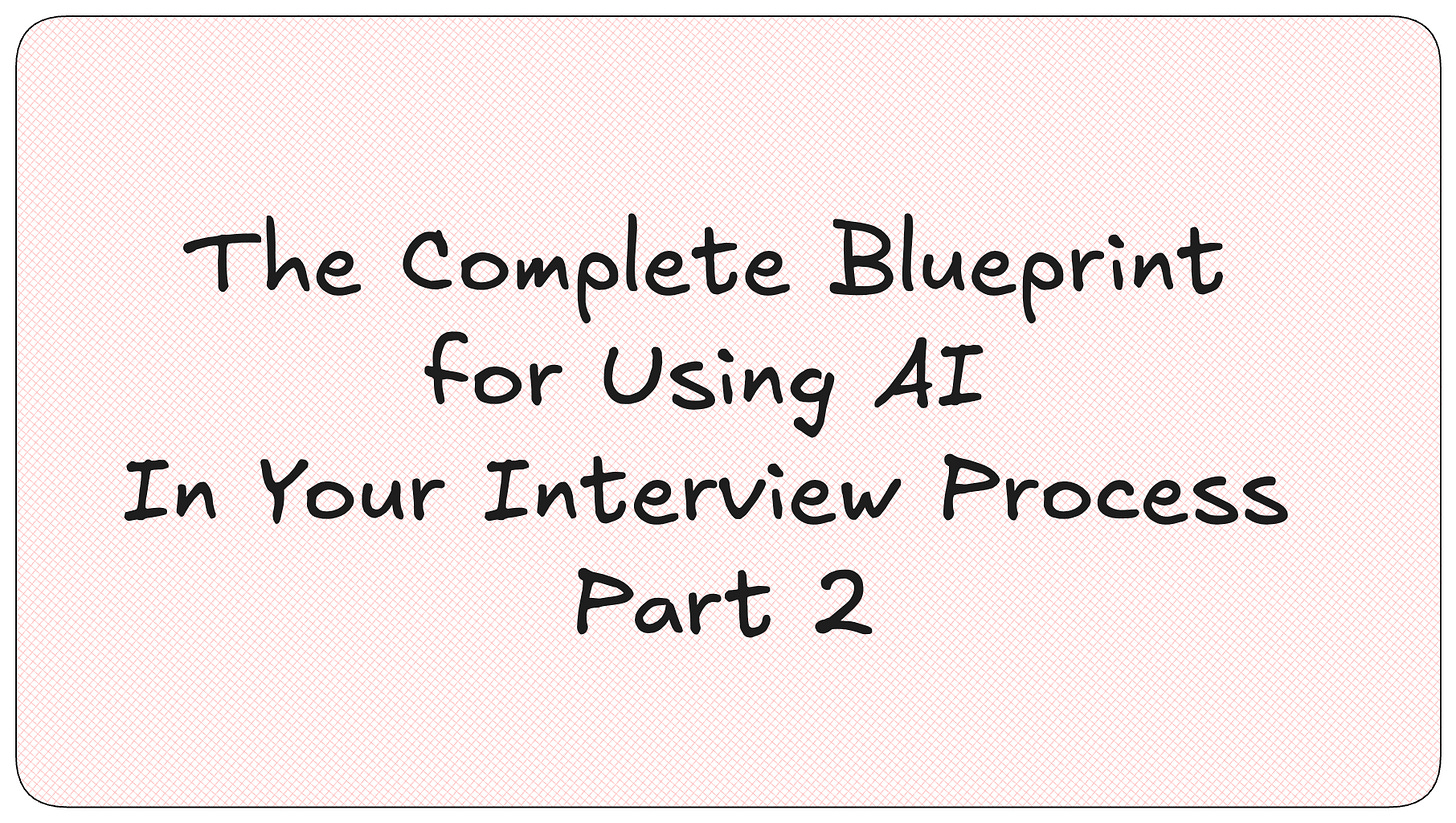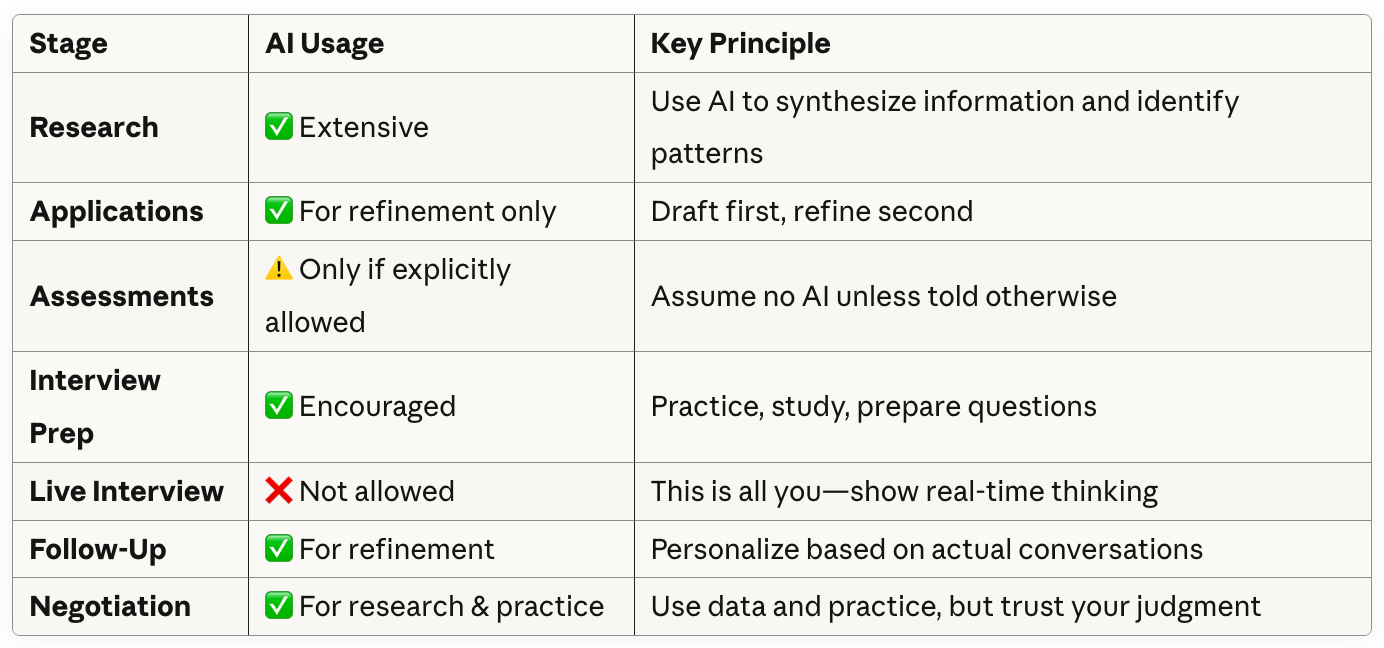The Complete Blueprint for Using AI in Your Interview Process - Part 2
Execution—The Dos and Don'ts of Using AI During and Post Interviews
Hey, Prasad here 👋 I’m the voice behind the weekly newsletter “Big Tech Careers.”
In this week’s article, I share how to use AI to prepare better for post interview process.
If you like the article, click the ❤️ icon. That helps me know you enjoy reading my content.
Welcome to Part 2!
In Part 1, we covered how to use AI assistants for the preparation stages of your interview journey—from initial research through interview prep. You learned how to leverage AI while maintaining your authentic voice and following industry best practices set by companies like Anthropic.
Now it’s time to execute. This article covers what happens when preparation meets reality: the live interview, post-interview follow-up, and offer negotiation.
Quick Recap: What We Covered in Part 1
Part 1: The Preparation Stages
Stage 1: Pre-Application Research & Strategy
Stage 2: Application Materials (Resume & Cover Letter)
Stage 3: Take-Home Assessments & Technical Challenges
Stage 4: Interview Preparation
In Part 2 (this article), we will cover the following:
Stage 5: During the Interview
Stage 6: Post-Interview Follow-Up
Stage 7: Offer Negotiation
Plus: Golden rules, best practices, and choosing the right AI assistant
Stage 5: During the Interview
The Goal: Show how YOU think in real-time.
This is all you—no AI assistance unless explicitly indicated otherwise.
Companies are curious to see how you think through problems in real time.
This isn’t about memorizing what AI told you. It’s about demonstrating the skills you’ve honed through AI-assisted preparation. Your preparation becomes internalized knowledge and confidence.
Why This Matters
Companies want to see:
How you break down ambiguous problems
How you communicate under pressure
How you collaborate and ask clarifying questions
Your authentic thought process and decision-making
How you handle uncertainty and course-correct
Your real-time problem-solving abilities
If you’ve prepared well with AI, you won’t need it here. The goal of AI-assisted prep isn’t to give you scripts—it’s to help you internalize frameworks, understand your own experiences better, and build confidence.
What Good AI Prep Looks Like in Live Interviews
Instead of reciting: A memorized AI-generated answer
Demonstrate: The thinking process AI helped you develop in your preparation
Example:
❌ Bad (Memorized AI Script): “In my previous role, I implemented a microservices architecture that improved system scalability by 40% and reduced deployment time by 60%...”
✅ Good (AI-Informed Authentic Response): “We were running into scaling issues with our monolith. Let me walk you through how I thought about the problem... [tell a genuine story with quantified impact that AI helped you articulate clearly]”
The Bottom Line
Your preparation with AI should make you MORE authentically you, not less. It should give you the confidence to think clearly, communicate effectively, and showcase your genuine experience.
Stage 6: Post-Interview Follow-Up
The Goal: Reinforce your interest and add value to the conversation.
What AI Assistants Can Do
Help you craft thoughtful, personalized follow-up messages that reference specific conversation points and add genuine value.
This is where AI shines again. You have authentic conversation notes, and AI can help you communicate effectively without losing your voice.
The Right Sequence
Write down specific notes from your interview immediately after
Draft your main points about what you want to say
Use AI to refine tone, structure, and clarity
Personalize the final version to sound like you
What NOT to Do
❌ Generic Templates: “Thank you for your time. I’m very excited about this opportunity...”
❌ AI-Written Content Without Personalization: Content that doesn’t reference your actual conversation or sounds overly formal
❌ Over-the-Top Enthusiasm: “This is my dream job and I would be absolutely thrilled...”
❌ Long Emails: Multi-paragraph emails that feel like you’re still interviewing
❌ Desperate Follow-Ups: Multiple emails asking about timeline or status
Pro Tips
Timing Matters:
Send within 24 hours while the conversation is fresh
Don’t follow up again too soon unless they’ve indicated a timeline that’s passed
Add Value, Don’t Just Thank: If you can share a relevant article, resource, or insight that relates to your discussion, do it. But don’t force it.
Keep It Brief: Your follow-up should be skimmable in 30 seconds. Respect their time.
Stage 7: Offer Negotiation
The Goal: Understand your market value and negotiate confidently and professionally.
What AI Assistants Can Do
Help you research compensation ranges, prepare negotiation talking points, think through tradeoffs, and practice negotiation conversations.
This stage requires both data analysis and emotional intelligence—areas where AI can provide support while you maintain control of the strategy.
Practical Approach
A. Research and Evaluation
Example Prompts:
“I have an offer for a Senior Engineering Manager role at a Series B startup in San Francisco: $200K base, $50K bonus, 0.5% equity (10M shares outstanding,last valued at $500M). Help me evaluate this offer considering: market rates for this role and experience level, the equity value and potential upside given their stage, and key questions I should ask before accepting or negotiating.”“Compare these components of my offer to market standards for a Staff Engineer in Seattle with 8 years experience: [list components]. What’s competitive? What might be low? What should I research further?”“I have two competing offers. Help me create a framework for comparing them that considers: compensation, equity potential, role scope, team quality, learning opportunities, and career trajectory. What questions should I ask myself to make this decision?”B. Negotiation Strategy
Example Prompts:
“I want to negotiate for a higher base salary and more equity. Help me draft talking points that emphasize my value without sounding entitled or making ultimatums. My key leverage points are: [list them]. What’s a professional way to frame this conversation?”“The offer is below market for my experience level. Help me craft an email that: (1) expresses genuine interest in the role, (2) presents market data professionally, (3) makes a specific counter-proposal, and (4) remains collaborative in tone.”“They can’t move on base salary but might on equity or signing bonus. Help me think through which lever is more valuable given: [your situation]. Then help me draft a response that focuses on the right components.”C. Practice Conversations
Example Prompt:
“Role-play a negotiation conversation with me. You be the recruiter, and
I’ll practice asking for a higher base salary. After each exchange, give
me feedback on my approach. My target is $180K, their offer is $160K, and my leverage points are: competing offer at $175K and specialized experience in their exact tech stack.”Pro Tips for Leadership Roles
Think Beyond Base Salary: Use AI to help you evaluate the total package:
Equity potential (not just percentage, but realistic exit scenarios)
Scope and impact of the role
Team quality and resources
Career trajectory and learning opportunities
Work-life balance and company culture
Example Prompt:
“I’m deciding between two VP Engineering offers. Help me create a decision framework that weighs: immediate compensation ($250K vs $220K base), equity value (0.5% at $800M vs 1.2% at $200M), team size (40 vs 15 direct/indirect reports), and company stage (Series C vs Series B). What questions should I ask to evaluate which is better for my 5-year career goals?”Negotiation Email Template (AI-Refined)
Your Draft to AI: “I want to negotiate. My points: offer is $160K, market is $180K-$200K, I have relevant experience X, Y, Z. I’m excited about the role.”
AI Refinement:
Subject: [Company] Offer - Excited to Discuss Next Steps
Hi [Recruiter Name],
Thank you for the offer for the [Role] position. I’m genuinely excited about [specific aspect of role/company] and believe I can make a significant impact on [specific challenge you discussed].
I’ve done some research on market rates for this role, and based on my
[X years of experience] and specialized background in [relevant expertise], I was expecting compensation in the $180K-$190K range. Would there be flexibility to adjust the base salary to better reflect the market and the value I’d bring to the team?
I’m happy to discuss this by phone if that would be helpful. I’m eager to find a package that works for both of us.
Thank you for your consideration,
[Your name]Remember: Personalize AI’s output. The above should sound like YOU, not an AI assistant.
Golden Rules for AI-Assisted Interview Execution
✅ DO:
Use AI to prepare for interviews, not during the interviews
Leverage AI for thoughtful follow-up communications
Research compensation thoroughly with AI’s help
Practice negotiation conversations to build confidence
Use AI to stress-test your thinking and strategy
Personalize everything AI generates to match your voice
❌ DON’T:
Use AI during live interviews (unless explicitly permitted)
Send generic AI-generated follow-ups without personalization
Copy-paste AI negotiation scripts without adaptation
Forget that the human relationship matters most
Rely solely on AI data—talk to real people in your network too
Why Anthropic’s Framework Matters for Everyone
Anthropic’s transparency about AI usage in hiring is a signal of how the industry is evolving. Here’s why their approach matters even if you’re not applying to Anthropic:
1. AI Collaboration is a Job Skill
If you’re interviewing for a tech or leadership role, you’ll likely use AI in your job. How you collaborate with AI during interviews demonstrates that skill.
2. Transparency is a Value Signal
Companies publishing AI guidance are signaling their values. They want candidates who use AI thoughtfully and ethically, important qualities for employees who will make similar judgment calls daily.
3. It’s About Judgment, Not Rules
The framework isn’t just “use AI here, not there.” It’s teaching you to think about WHEN AI adds value vs. when it undermines authenticity. That judgment transfers to your work.
4. More Companies Will Follow
While Anthropic is among the first to publish explicit guidance, expect more companies to follow suit. Those who use AI thoughtfully now are ahead of the curve.
Quick Reference: The Complete Framework
Final Thought: The Human Advantage in an AI World
AI assistants can help you prepare, research, practice, and refine. They can help you follow up thoughtfully and negotiate strategically. But they can’t be you.
Your unique experiences, your judgment in complex situations, your ability to read a room, your creative problem-solving under pressure, your emotional intelligence, your authentic passion for the work - these remain distinctly human.
The goal isn’t perfect AI usage. It’s using AI to help you show up as the best, most prepared, most authentic version of yourself.



